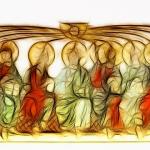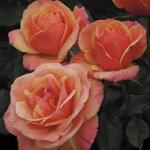Pastor Dan, the interim pastoral caretaker of the Lutheran church that Jeanne attends (and I do occasionally) started the new year texting some scripture verses daily (just the location–you have to look them up) to parishioners who are interested each morning followed simply by the invitation “Thoughts”? I don’t participate in the ensuing conversation that often, but a couple of weeks ago the prompt was “Psalm 1–Thoughts?” and I had to say something. Here’s how Psalm 1 begins as I memorized it as a youth:
Blessed is the man who walks not in counsel of the ungodly, nor stands in the path of sinners, nor sits in the seat of the scornful
But his delight is in the law of the Lord, and in His law he meditates day and night.
He shall be like a tree planted by the rivers of water, that brings forth its fruit in its season, whose leaf also shall not wither; and whatever he does shall prosper.
I commented that
I particularly like verse 3. Trees have specispiritual importance for me. And the Ents are my favorite characters in Lord of the Rings.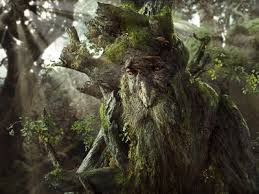
My love affair with trees is taking a serious hit this early summer because a lot across the road from us that has been vacant for the three decades we have lived here has been sold and a house will be going up. This will require the taking down of an at least 70 foot tall maple tree. I hate it when that happens.
As noted in my comment on Pastor Dan’s thread, of the dozens of creatures in Tolkien’s The Lord of the Rings, the Ents are my favorites. Trees adopt the general plant survival strategy of choosing a location that will provide sufficient food, water, and sunlight, then hunkering down in a permanent installation designed to stand up to all dangers for as long as possible—a very different plan from the animal strategy of being nimble, mobile, and capable of running away from danger. A massive red oak outside the front door of my sabbatical apartment at a Minnesota ecumenical institute over a decade ago became an iconic symbol of internal changes that I was experiencing. The introduction to my 2017 book Freelance Christianity focused on my Minnesota oak. I wrote that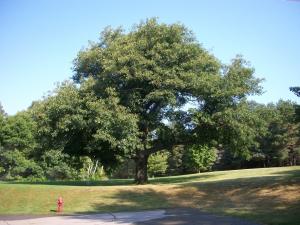
When I think of Collegeville, the first image that invariably comes to mind is my oak. Growth, stability, silence, fortitude, rootedness—that oak represents all of the things that I hope to have carried at least a bit from my months in Minnesota.
I closed the introduction with a verse from Isaiah: They will be called oaks of righteousness, a planting of the Lord for the display of his splendor.
Once a number of years ago I took a Facebook quiz that would answer the burning question “Which Dr. Seuss character are you?” I learned that
You are The Lorax. You are wise and intelligent. You have strong beliefs but are also able to see both sides of every issue and you understand that not everything is black and white. You are contemplative, kind, and reflective. You never rush into something but first consider it thoughtfully from every angle.
I know that these quizzes are intended to tell the quiz taker nothing but what she or he wants to hear, but I don’t care. I’m happy if any of this description fits me even ten percent of the time. But most importantly, I am happy to be the Lorax because according to the text of Dr. Seuss’ classic tale, the Lorax “speaks for the trees.”
The Lorax was Dr. Seuss’ favorite of his multitude of books; he reportedly said that the book “came out of me being angry. In The Lorax I was out to attack what I think are evil things and let the chips fall where they might.” The evil things Dr. Seuss was angry about included corporate greed and the threat of such greed to nature and the environment. The Lorax is full of the outrageous characters one expects from Dr. Seuss, including the Once-Ler who tells the story of how he made a fortune crafting an impossibly useful garment, the Thneed, out of the wooly foliage of the Truffula tree—a type of tree that no longer exists.
The day the Once-Ler cuts down his first Truffula tree, a creature called the Lorax, who “speaks for the trees” because they have no tongues, emerges from the tree stump and criticizes the Once-Ler for having sacrificed a tree for such a mercenary purpose. But the Once-Ler soon finds that there is great consumer demand for Thneeds, a large factory is built, and he becomes fabulously rich. But animals who live in the Truffula forest and eat its nourishing fruit have to leave, and eventually the last Truffula tree is cut down. The Lorax says nothing but with one sad backward glance lifts himself into the air and disappears behind the smoggy clouds. Where he last stood is a small monument engraved with a single word: “UNLESS.”
To paraphrase Max Ehrmann, trees are children of the universe who have a right to be here. And the tree that will be coming down across the road had a right to be here. I am very concerned about the preservation of our environment, but in truth my love of trees is more personal than general. We have two trees in our front yard—Blue and Chuck—who have been part of our family for the more than twenty-five years we have lived in our house.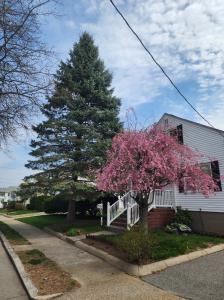
Blue started his life with us as a four-foot living Christmas tree in our living room during the 1996 holiday season. We were warned that there was only a 50% chance that Blue would survive the months he spent in our garage where he moved from the house after the New Year, biding his time until we planted him the next April; thirty years later, he is now a perfectly shaped 40-foot tree whose bottom branches I have to cut off every other year, lest he overwhelm the sidewalk. Thank goodness I planted him far from any power lines—some of his largest branches are now touching the upper branches of the 70-foot oak across the street.
Chuck joined us a year or so after Blue, a flowering miniature weeping cherry whose name comes from his similarity, as a one-branched twig when I planted him, to Charlie Brown’s iconic and sad-looking Christmas tree. I have to give Chuck, who sports lovely pink flowers in the spring, a significant haircut at least twice per summer—he rejects the “miniature” part of his description and would like to be as tall as Blue. I talk to these trees regularly, as I do to all of my outdoor and indoor plants. As with the Ents, Chuck and Blue seldom say anything. But when they do, it is worth remembering.



